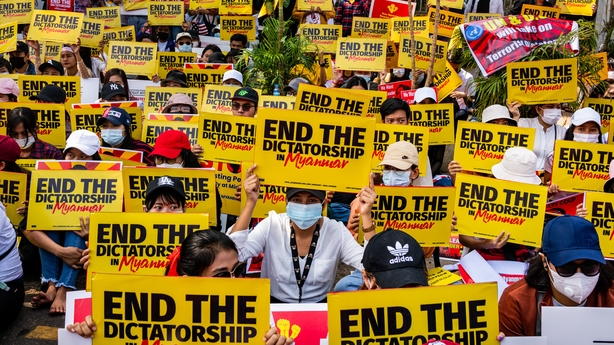Myanmar's military has drawn fresh international criticism by slapping a new charge on deposed civilian leader Aung San Suu Kyi.
Generals also cut off the internet for a third straight night in a bid to grind down an anti-coup uprising.
In the two weeks since the military ousted Ms Suu Kyi and put her under house arrest in the administrative capital Naypyidaw, big cities and isolated village communities alike have been in open revolt.
The military justified its power seizure by alleging widespread voter fraud in November elections won by ms Suu Kyi's party.
After her detention in a dawn raid on 1 February, the day of the coup, she was charged under an obscure import and export law, over walkie talkies that were found in her home during a search.
The Nobel laureate's lawyer said today she had been hit with a second charge, of violating the country's disaster management law.
"She was charged under section 8 of the Export and Import law and section 25 of the Natural Disaster Management law as well," said Khin Maung Zaw.
While it was unclear how the disaster law applied in Ms Suu Kyi's case, it has been used against deposed president Win Myint, also arrested on 1 February, relating to a campaign event that the junta alleges broke coronavirus-related restrictions.
Khin Maung Zaw added that Ms Suu Kyi and the president, both of whom he has yet to have any contact with, were expected to appear via video conference during a trial on 1 March.
The United States said it was "disturbed" by the news, and renewed demands for Ms Suu Kyi's release.
"We call on the Burmese military to immediately release all unjustly detained civilian and political leaders, journalists and human rights activists and other members of civil society as well as to restore the democratically elected government," State Department spokesman Ned Price told reporters.
British Prime Minister Boris Johnson also voiced his condemnation, calling the charges against Ms Suu Kyi "fabricated" and a "clear violation of her human rights".
"We stand with the people of Myanmar and will ensure those responsible for this coup are held to account," he tweeted.

More than 420 people have been arrested since the coup, according to a list of confirmed detentions from the Assistance Association for Political Prisoners monitoring group.
Military spokesman Zaw Min Tun said that both Ms Suu Kyi and the president were in a "safer place" and "in good health".
"It's not like they were arrested -- they are staying at their houses," the general, who became the country's vice-minister of information after the coup, told a press conference.
Security forces have used increasingly heavy measures to quell huge nationwide street protests and a disobedience campaign encouraging civil servants to strike.
Troops have fanned out around the country in recent days.
Rubber bullets, tear gas and even sling shots have been used against protesters, and one demonstration in Mandalay saw police beating journalists hours before authorities again cut internet access.
"They shut down the internet because they want to do bad things," said Win Tun, a 44-year-old who lives in the commercial capital Yangon.
"We didn't sleep the whole night so we could see what would happen."
Undeterred, crowds returned to the streets of Yangon and around the country.

